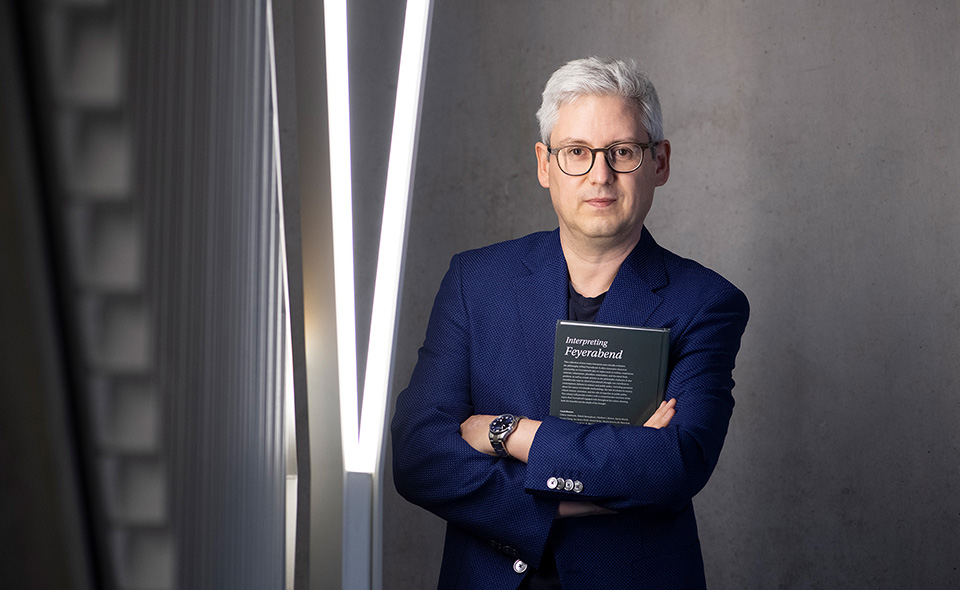
Karim Bschir (Fellow 2012–17)
Uncertainty in Science: How Science Deals with Probability and Potentiality
With a degree (BSc/MSc) in biochemistry and a doctorate in philosophy, Karim Bschir is well equipped to tackle questions relating to the role of science in society by asking questions such as the extent to which scientists are morally responsible for unintended consequences of their discoveries. Many influential researchers argue that the only responsibility of science is to produce robust knowledge and to put it to some use. Accordingly, scientists are only obliged to find truth and maintain objectivity. But one could argue that those who accept foreseeable negative consequences of their actions act negligently and recklessly, which is morally reprehensible. Scientists thus also bear a moral responsibility for the negative consequences of their actions, insofar as they were foreseeable.
“Specialization always felt like an imposition to me,” is how Karim, today an Alumnus of the Branco Weiss Fellowship, describes his motives for becoming a researcher. In high school he enjoyed studying Latin in the morning and working in the biology lab in the afternoon. His intellectual appetite craved both natural sciences and humanities. He found it ridiculous to have to choose a major – thus his decision to pursue both biochemistry and philosophy. “I benefited tremendously from combining these fields,” he says, “because it brought me into a position where I could study science and engage with it philosophically at the same time.”
Karim published his doctoral thesis on the realism debate in science as a book under the title Wissenschaft und Realität(Mohr Siebeck, 2012). Profiting from the freedom of mobility offered by the Branco Weiss Fellowship, he was then a visiting researcher at the London School of Economics, at Leibniz University in Hanover, and at the University Roma Tre. From 2007 to 2016 he was affiliated with the Collegium Helveticum in Zurich. In autumn 2014 Karim moved to the Center for Philosophy of Science at the University of Pittsburgh. He served as a scientific advisor at the Swiss Science Council, and as of January 2021 has been the managing director of the ethics commission at the University of St. Gallen.
His next book project aims at a systematic philosophical presentation of scientific predictions and the uncertainty related to science-based forecasts. Because decision-makers in modern societies rely heavily on scientific advice, questions about the reliability of scientific predictions are becoming increasingly relevant. Understanding the limits of scientific prediction is therefore crucial in dealing with complex problems. Accordingly, the way in which predictive uncertainties are dealt with and communicated is a matter of public concern. The distinction between different types and sources of scientific uncertainty forms the basis for a rigorous philosophical discussion.
Karim found inspiration in the work of the philosopher of science Paul Feyerabend, who was both widely read during his lifetime and at the same time outlawed among his peers. A good twenty years after Feyerabend’s passing, Karim gathered an impressive number of colleagues who were prepared to write a contribution to an anthology on this proponent of pluralism and epistemological anarchism. The book will be published in 2021. Alongside his publication activities, Karim has also organized two extremely well-attended panel discussions with Harvard historian of science Naomi Oreskes on the responsibility of researchers in the climate debate.
Another main topic of interest in Karim’s research is the development of scientific knowledge over time. Science produces robust knowledge about empirical reality. The fact that new ideas have to go through a systematic process of debate and experiment guarantees the robustness of scientific knowledge. At the same time, science must remain open to new ideas and be able to change fundamentally. “It’s a balancing act,” says Karim. “On the one hand, scientists want to produce robust and durable knowledge. On the other hand, all scientific knowledge claims remain, in principle, subject to falsification or revision. This makes the study of science and its history a highly fascinating subject.”
